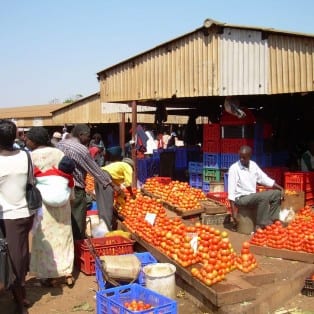Among the world’s most vulnerable workers are those marginalized within their economies and societies, namely the women and labor migrants who predominate in the informal economy, where they perform valuable work in low-wage jobs as janitors, domestic workers, agricultural workers, home healthcare workers, market vendors, day laborers and others. Today, many of these workers are on the coronavirus front lines, risking their health without benefit of paid sick leave, COVID-19 relief programs or personal savings. Others are working where they can, if they can, to survive.
Although more than 2 billion workers globally make their living in the informal economy and can create up to half of a country’s GDP, they have limited power to advocate for living wages and safe and secure work, and never more so than during the current pandemic when informal-sector workers are disproportionately falling through the cracks. Due to the failure of governments to build systems of universal social protection, the world is facing the pandemic with 70 percent of all people lacking a safety net, says International Confederation of Trade Unions (ITUC) General Secretary Sharan Burrow. Also, despite their vast numbers—61 percent of the world’s workers work in the informal economy and, in developing countries, that number can rise to 90 percent of a country’s workforce—informal-sector workers are consistently overlooked by legislators and policy makers for economic assistance and legal protections during the current crisis.
A new brief from the UN’s International Labor Organization (ILO) warns that workers earning their livelihoods in the informal economy in 2020 are being forced “to die from hunger or from the virus” and offers a raft of immediate, medium- and long-term recommendations for governments and employers’ organizations to address the crisis. Without urgent action, quarantine threatens to increase relative poverty levels in low-income countries by as much as 56 percentage points, according to the brief.
The far-reaching effects of the coronavirus pandemic have expanded global calls for a new social contract by worker rights organizations that are championing a “build back better” campaign as well as by some businesses that recognize the unsustainability of economic and social structures in which workers absorb the burdens of our economies but not the benefits.
Unions and worker rights activists are stepping into the breach, giving voice to workers’ struggles during lockdown, providing relief where resources allow and banding together to urge governments to provide financial and other social support for informally employed workers, as well as protection from harassment.
- The Central Organization of Trade Unions-Kenya (COTU-K) distributed protective gear, such as masks, gloves, soap and hand sanitizer to workers before shops were closed, and has met with the Kenyan government to lobby for support for informal workers, who comprise some 80 percent of the workforce.
- In Zimbabwe, informal economy association ZCIEA is giving voice to vendors’ struggle for survival under quarantine and advocating for their right to operate. In Harare, even though markets are legally open and deemed essential for citizens to secure food, ZCIEA Chitungwiza Territorial President Ratidzo Mfanechiya says that ZCIEA has had to intervene with the town manager, town council and local police to protect Jambanja market vendors’ right to operate free of harassment and forced removal during the five-week lockdown. She is also speaking out against gender-based violence, given that many women are reporting incidents of abuse while trapped at home with partners during lockdown.
- The Alliance Against Violence & Harassment in Jordan, a Solidarity Center partner, is urging the government to grant assistance to migrant workers, who have little or no pay but cannot return to their country of origin. The Alliance also asks for safety gear for migrant workers still on the job. The domestic workers solidarity network in Jordan shares information on COVID-19 and its impact on workers in multiple languages on its Facebook page.
- Leaders of multiple women’s worker rights movements banded together in May to make a joint call on the world’s governments to collaborate at all levels with domestic workers, street vendors, waste pickers and home-based workers during the COVID-19 crisis so that some of the world’s most important systems traditionally propped up by informally-employed women—including food supply, the care economy and waste management—are preserved.
- In India, where an estimated 415 million workers, or 90 percent of the country’s total workforce, toiled in informal-sector jobs in 2017–18, trade unions lobbied Labor Minister Santosh Gangawar for income support and eviction support for more than 40 categories of informal workers hit by the coronavirus pandemic.
In 2018, the workforce in informal employment in Africa was 86 percent; in Asia and the Pacific and the Arab states, 70 percent; in the Americas, 40 percent; and in Europe and Central Asia, 25 percent.

